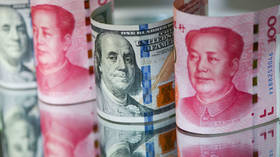Share of dollar in global reserves lowest in 28 years – IMF

The process of diversifying away from the greenback by countries around the world is gathering pace, according to the latest data from the International Monetary Fund.
The statistics tracked by the Washington-based institution show that the dollar’s share of official gold and foreign currency reserves dropped to a nearly three-decade low of 58% in the fourth quarter of 2022.
The move has reportedly been gradual and the dollar share of central banks’ foreign reserves is now nearly down to a level last seen in 1995.
The long-standing status of the dollar as the world’s dominant currency has been steadily eroded in recent years amid concerns over soaring US debt and widely implemented sanctions using the currency as leverage.
The shift was more pronounced when adjusted for exchange rates, according to Stephen Jen, CEO of Eurizon SLJ Capital Limited, as quoted by Reuters.
“What happened in 2022 was a very sharp plummeting in the dollar share in real terms,” he said, calling the decline a reaction to the freezing of half of Russia’s $640 billion in gold and FX reserves.
According to Jen, the drastic step sparked a rethink in countries like Saudi Arabia, China, India and Türkiye about diversifying their reserves to other currencies.
The yuan’s share of global over-the-counter forex transactions has increased from nearly zero 15 years ago to 7%, according to the Bank for International Settlements (BIS).
After the move against Russia, other countries are questioning “What if you fall on the wrong side of sanctions?” BNY Mellon strategist Geoffrey Yu told the media.
He said global central banks are currently seeking to diversify their assets, scooping up corporate debt, tangible assets such as real estate, and other currencies.
“This is the process that is underway,” Mark Tinker, managing director of Toscafund Hong Kong, told the agency. “The dollar is going to be used less in the global system.”
For more stories on economy & finance visit RT's business section













